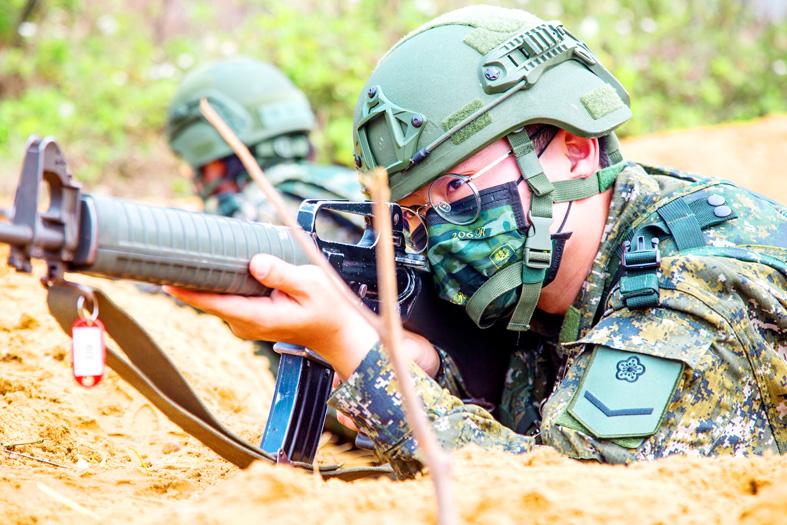More than half of Taiwanese are confident in the nation’s self-defense capabilities, and about 73 percent are willing to fight in the event of war, a poll in the latest edition of the Defense Security Journal found.
The poll in the Institute for National Defense and Security Research’s (INDSR) biweekly journal was part of an article by INDSR researcher Lee Kuan-chen (李冠成), in which Lee said that Taiwan’s resolve to defend itself has never wavered.
While the March poll found that about 73 percent of Taiwanese would fight for their nation in the event of a Chinese invasion, a similar poll in September last year found that about 75 percent would.

Photo: Military News Agency
In the September poll, about 58 percent of the respondents expressed confidence in the military’s self-defense capabilities, while the figure dropped to about 54 percent in the March poll.
While there was a dip in respondents’ confidence, it was within the poll’s margin of error, the report said, adding the March results indicated Russia’s war in Ukraine has not dampened Taiwanese’s determination to defend their nation.
The public’s positive response to the military’s most recent reservist training program and growing support for extending the mandatory service period was also high, demonstrating that people are resolved to defend their country, Lee said.
The greatest impact the Ukraine war had was on the public’s belief that the US would send troops to help defend Taiwan, Lee said.
About 57 percent of respondents in the September poll answered “certainly” or “maybe” in response to the question: “Will the US send troops to help Taiwan in the event of a war across the Taiwan Strait?” That figure dropped to 40 percent in the March poll.
Lee said that this indicates a more reserved attitude toward the possibility of assistance from friendly nations.
The survey showed that, under the condition that the US would send troops to help Taiwan, about 95 percent of those who are confident in the nation’s defensive capabilities would be willing to fight, whereas among those who expressed a lack of confidence in the military’s self-defense capabilities, only 65 percent would fight.
Under the condition that the US would not send troops to help Taiwan, about 89.8 percent of those confident in the nation’s self-defense capabilities would fight for their nation, while 60 percent of those lacking confidence would fight.
Lee’s study showed that regardless of US military assistance, believing in Taiwan’s military capabilities correlates with a willingness to fight for the nation.
Lee said that confidence in Taiwan’s military is crucial in influencing the public’s spirit of resistence.
The March poll was conducted by National Chengchi University from March 9 to 13, targeting individuals aged 20 or older.
The poll received 1,080 valid samples, with 756 interviews conducted via landline and 324 via cellphones, and has a margin of error of 2.98 percent, with a 95 percent level of confidence.

The Central Election Commission has amended election and recall regulations to require elected office candidates to provide proof that they have no Chinese citizenship, a Cabinet report said. The commission on Oct. 29 last year revised the Measures for the Permission of Family-based Residence, Long-term Residence and Settlement of People from the Mainland Area in the Taiwan Area (大陸地區人民在台灣地區依親居留長期居留或定居許可辦法), the Executive Yuan said in a report it submitted to the legislature for review. The revision requires Chinese citizens applying for permanent residency to submit notarial documents showing that they have lost their Chinese household record and have renounced — or have never

A magnitude 5.6 earthquake struck off the coast of Yilan County at 12:37pm today, with clear shaking felt across much of northern Taiwan. There were no immediate reports of damage. The epicenter of the quake was 16.9km east-southeast of Yilan County Hall offshore at a depth of 66.8km, Central Weather Administration (CWA) data showed. The maximum intensity registered at a 4 in Yilan County’s Nanao Township (南澳) on Taiwan’s seven-tier scale. Other parts of Yilan, as well as certain areas of Hualien County, Taipei, New Taipei City, Taoyuan, Hsinchu County, Taichung and Miaoli County, recorded intensities of 3. Residents of Yilan County and Taipei received

Taiwan has secured another breakthrough in fruit exports, with jujubes, dragon fruit and lychees approved for shipment to the EU, the Ministry of Agriculture said yesterday. The Animal and Plant Health Inspection Agency on Thursday received formal notification of the approval from the EU, the ministry said, adding that the decision was expected to expand Taiwanese fruit producers’ access to high-end European markets. Taiwan exported 126 tonnes of lychees last year, valued at US$1.48 million, with Japan accounting for 102 tonnes. Other export destinations included New Zealand, Hong Kong, the US and Australia, ministry data showed. Jujube exports totaled 103 tonnes, valued at

BIG SPENDERS: Foreign investors bought the most Taiwan equities since 2005, signaling confidence that an AI boom would continue to benefit chipmakers Taiwan Semiconductor Manufacturing Co’s (TSMC, 台積電) market capitalization swelled to US$2 trillion for the first time following a 4.25 percent rally in its American depositary receipts (ADR) overnight, putting the world’s biggest contract chipmaker sixth on the list of the world’s biggest companies by market capitalization, just behind Amazon.com Inc. The site CompaniesMarketcap.com ranked TSMC ahead of Saudi Aramco and Meta Platforms Inc. The Taiwanese company’s ADRs on Tuesday surged to US$385.75 on the New York Stock Exchange, as strong demand for artificial intelligence (AI) applications led to chip supply constraints and boost revenue growth to record-breaking levels. Each TSMC ADR represents